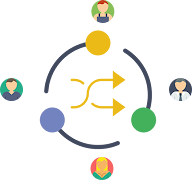What is DevOps for beginners?
DevOps for beginners involves understanding the fundamental concepts, principles, and practices of DevOps without diving too deep into complex technical details. Here's a beginner's overview of DevOps:
Definition of DevOps
DevOps is a set of practices that focuses on collaboration and communication between software development (Dev) and IT operations (Ops) teams. Its goal is to automate and streamline the software delivery process, enabling faster and more reliable releases of software applications.
Key Concepts
Collaboration: DevOps emphasizes breaking down silos between development and operations teams to encourage cooperation and shared responsibility.
Automation: Automation is a core principle, involving the use of tools and scripts to automate repetitive tasks like code deployment, testing, and infrastructure provisioning.
Continuous Integration (CI): CI involves frequently integrating code changes into a shared repository and running automated tests to detect and address integration issues early.
Continuous Delivery (CD) and Continuous Deployment: CD practices automate the release process, allowing software to be deployable at any time. Continuous Deployment goes a step further by automatically deploying code changes to production after passing tests.
Infrastructure as Code (IaC): IaC treats infrastructure provisioning as code, enabling the automated creation and management of infrastructure resources.
Monitoring and Feedback: Real-time monitoring and feedback loops provide insights into application and infrastructure performance, enabling teams to respond quickly to issues and make improvements.
Benefits
Faster software delivery.
Improved software quality.
Reduced manual work and errors.
Enhanced collaboration between teams.
Efficient resource management.
Better response to customer feedback and changing requirements.
Tools
DevOps uses a variety of tools for automation and collaboration, such as version control systems (e.g., Git), CI/CD pipelines (e.g., Jenkins, Travis CI), containerization platforms (e.g., Docker), configuration management tools (e.g., Ansible, Puppet), and monitoring solutions (e.g., Prometheus, Grafana).
Getting Started
For beginners, here are some steps to start learning DevOps:
Learn the basics of version control with Git.
Explore continuous integration and continuous delivery concepts.
Get hands-on experience with automation tools and scripting languages.
Study foundational DevOps principles and practices.
Consider taking online courses or tutorials on DevOps topics.
Experiment with creating a simple CI/CD pipeline for a personal project.



Comments
Post a Comment